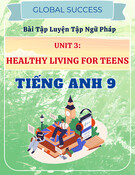
9th grade synthesized English grammar
Microsoft English grammar grade 9
1
Appendix
Part
Content
Page
I
Tense - Các thì
II
Conditional sentences - Câu điều kiện
III
Wish - Câu ước
IV
Passive Voice - Câu B Đng
V
Reported Speech - Câu Trực Tiếp - Gián Tiếp
VI
Tag Question - Câu hỏi đuôi
VII
Relative Clauses - Mệnh Đề Quan Hệ
VIII
Comparison - Câu so sánh
IX
Article - Mạo từ
X
Quantifiers – Đnh lượng từ
XI
Enough, Too, So, Such
XII
Structures to V, V_ing – Cấu trúc to V, V_ing
XIII
Clauses and Phases - Mệnh đề và Cụm từ
I. WISH – Clauses & IF ONLY – Clauses
(Mệnh đề ước)
II. PHRASES / CLAUSES OF PURPOSE
(Cụm từ/ Mệnh đề chỉ mục đích):
III. PHRASES / CLAUSES OF RESULT
(Cụm từ / Mệnh đề chỉ kết quả)
IV. PHRASES/ CLAUSES OF REASON
(Cụm từ / Mệnh đề chỉ lý do)
V. PHRASES / CLAUSES OF CONCESSION
(Mệnh đề / Cụm từ chỉ sự nhượng b)
VI. AS IF/ AS THOUGH/ IT’S (HIGH)TIME / WOULD RATHER
XIV
So, Too, Neither, Either
XVI
Conjunctions - Liên Từ

9th grade synthesized English grammar
English grammar grade 9
2
English grammar grade 9
I. Tense - Thì tiếng anh
1. Thì hiện tại đơn - simple present tense
a. Công thức
- Với đng từ thường
Khẳng đnh : S + Vs/es …
Phủ đnh : S+ do/does + not + V…
Nghi vấn : Do/does + S + V…?
- Với đng từ tobe
Khẳng đnh : S+ am/ is/ are + o
Phủ đnh : S + am/ is/ are + not + o
Nghi vấn : Am/ is/ are + s + o
Lưu ý : Ta thêm "Es" Sau các động từ tận cùng là: o, s, x, ch, sh.
b. Dấu hiệu nhận biết: Always, usually, often, sometimes , generally, seldom, etc., (a fact, habit, or
repeated action), every time, as a rule, every day (every other day), once (a month), once in a while,…
c. Cách dùng:
1. Thì hiện tại đơn diễn tả mt chân lý , mt sự thật hiển nhiên.
Ex: The sun ries in the East.
2. Thì hiện tại đơn diễn tả 1 thói quen , mt hành đng xảy ra thường xuyên ở hiện tại.
Ex: Mary often goes to school by bicycle.
3. Thì hiện tại đơn diễn tả năng lực của con người :
Ex : He plays badminton very well
4. Thì hiện tại đơn còn diễn tả mt kế hoạch sắp xếp trước trong tương lai hoặc thời khoá biểu , đặc biệt
dùng với các đng từ di chuyển.
2. Thì hiện tại tiếp diễn - present progressive
a. Công thức:
Khẳng đnh : S + be (am/ is/ are) + V_ing …
Phủ đnh : S+ be + not + V_ing …
Nghi vấn : Be + s+ V_ing …
b. Cách dùng:
1. Diễn tả mt hành đng đang xảy ra ở thời điểm đang nói.
Ex: I am reading. ( Tôi đang đọc)
2. Mt hành đng xảy ra có tính chất tạm thời.
Ex: She is working (cô ấy đang làm việc)
3. Mt hành đng lúc nào cũng xảy ra liên tục. (thường có thêm usually, always... trong câu).
Ex: I am usually thinking of you (tôi thường nghĩ về bạn).
a. Chỉ mt việc đang xảy ra ngay lúc nói chuyện/hiện hành.
Ex: I am reading an English book now.
b. Chỉ việc xảy ra trong tương lai (khi có trạng từ chỉ tương lai).
Ex: I am going to call on Mr. John tom / I am meeting her at the cinema tonight.
Những động từ không chia ở HTTD
- know
-understand
- keep
- be
- see
- hear
- hope
- wish
- smell
- seem
- need
- consider
- expect
- sound
- agree
- notice
- look
- start
-begin
- finish
- stop
- taste
- enjoy
- love/ like
- want
- prefer
- fall
- wonder
- have to
- feel .....

9th grade synthesized English grammar
English grammar grade 9
3
c. Từ nhận biết: Right now , at the moment , at present , now , shhh! , listen! , look! , this semester . At the
time = at this time = at present (hiện nay)
- at the present - do you hear?
- keep silent ! = Be quiet! - pay attention to !
- don’t make noise: - today
- hurry up! - still
- don’t talk in class - where + be + s ? ...........
3. Thì hiện tại hoàn thành - present perfect
a. Công thức:
Khẳng đnh : S + have/ has + past participle (V3)
Phủ đnh : S + have/ has + not+ past participle (V3)
Nghi vấn : Have/ has +S+ past participle (V3)
* Lưu ý : I, THEY ,WE, YOU + HAVE + (V3)
SHE, HE, IT + HAS + (V3)
b. Cách dùng:
- Thì hiện tại hoàn thành diễn tả hành đng đã xảy ra hoặc chưa bao giờ xảy ra ở 1 thời gian không xác
đnh trong quá khứ.
- Thì hiện tại hoàn thành cũng được dùng với since và for.
- Since + mốc thời gian (1995, I was young, this morning etc.) Khi người nói dùng since, người nghe phải
tính thời gian là bao lâu.
- For + khoảng thời gian (từ lúc đầu tới bây giờ) Khi người nói dùng for, người nói phải tính thời gian là
bao lâu.
- Diễn tả hành đng đã xảy ra trong quá khứ, vẫn kéo dài đến hiện tại (có thể đến tương lai).
- Diễn tả hành đng xảy ra trong quá khứ nhưng không đề cập đến thời gian cụ thể.
- Diễn tả hành đng xảy ra lặp đi lặp lại nhiều lần trong qk nhưng không đề cập đến thời gian.
- Diễn tả hành đng xảy ra trong quá khứ còn hậu quả ở hiện tại.
c. Từ nhận biết:
Never, ever, in the last fifty years, this semester (summer,year…) , since, for, so far, up to now, up until ,
just, now, up to the present, yet, recently, lately, in recent years, many times, once, twice, and in his/her
whole life, Already, the first time, the second times, the third times…
Chú ý: s + have/ has + never/ever/ already /just… + (V3)
4. Thì Hiện Tại Hoàn Thành Tiếp Diễn (Present Perfect Continuous):
a. Công thức
Khẳng đnh : S + have/ has + been + V_ing + O
Phủ đnh : S + have/ has + not + been + V_ing + O
Nghi vấn : Have/ has + S + been + V_ing + O?
b. Từ nhận biết:
all day, all week, since, for, for a long time, almost every day this week, recently, lately, in the past week,
in recent years, up until now, and so far.
c. Cách dùng: Thì hiện tại hoàn thành tiếp diễn nhấn mạnh khoảng thời gian của 1 hành đng đã xảy ra
trong quá khứ và tiếp tục tới hiện tại (có thể tới tương lai).
5. Thì quá khứ đơn - past simple
a. Công thức:
- Với đng từ thường
Khẳng đnh : S + V2/ed …
Phủ đnh : S + did+ not + V…
Nghi vấn : Did + S + V…?
- Với tobe

9th grade synthesized English grammar
English grammar grade 9
4
Khẳng đnh : S + was/were …
Phủ đnh : S+ was/ were + not …
Nghi vấn : Was/were + S … ?
b. Cách dùng : Diễn tả hành đng xảy ra và chấm dứt tại mt thời điểm hoặc thời gian xác đnh trong quá
khứ
c. Dấu hiệu nhận biết
- Yesterday, ago, last (night, week, month, year..), from… to .
- In + năm trong quá khứ (vd: in 1995, 1999), in the old days
* Chú ý :
Chủ từ + đng từ quá khứ
When + thì quá khứ đơn (simple past)
When+ hành đng thứ nhất
6. Thì quá khứ tiếp diễn - past progessive
a. Công thức
Khẳng đnh : S + was/were + V_ing …
Phủ đnh : S + wasn’t/weren’t+ V-ing …
Nghi vấn : Was/were + s+ V-ing …?
Lưu ý: I, THEY, WE , YOU + WERE + V-ing
SHE, HE, IT + WAS + V-ing
Chủ ngữ + were/was + đng từ thêm -ing
While + thì quá khứ tiếp diễn (past progressive)
b. Cách sử dụng
1. Diễn tả hành đng đang sảy ra tại thời điểm xác đnh trong quá khứ
Ex: What were you doing at 8.00 last night ? I was watching television .
2. Diễn tả mt hành đng đang diễn ra thì b hành đng khác xen vào trong quá khứ
Ex: While I was having a bath, the phone rang .
3. Diễn tả hai hành đng đang diễn ra cùng mt lúc
Ex: I was learning my lesson while my parents were watching TV at 8.30 last night.
c. Các từ nhận biết:
- At that moment ( vào lúc đó)
- At that time ( vào lúc đó)
- At this time yesterday ( vào lúc này hôm qua)
- At this time last night ( vào lúc này tối hôm qua)
- At 4 (5, 6 …) o'clock yesterday ( vào lúc 4 (5, 6…) giờ hôm qua.)
- All day yesterday ( suốt ngày hôm qua)
- All last week = during last week (trong suốt tuần) + thời gian ở quá khứ
- The whole of….(toàn b) + thời gian ở quá khứ
7. Thì Quá Khứ HOÀN THÀNH - (Past perfect)
a. Công thức
Khẳng đnh : S + had + V3/ed…
Phủ đnh : S + had + not +V3/ed…
Nghi vấn : Had + S + V3/ed…. ?
b. Cách sử dụng
- Diễn tả mt hành đng xảy ra trước mt hành đng khác hoặc thời điểm khác trong quá khứ.
- Chúng ta thường sử dụng các từ nối như before, after, just, when, as soon as, by the time, until,…
Ex: After I had cleaned the room, my mom called (Sau khi tôi dọn xong phòng thì mẹ gọi)
- Hành đng xảy ra như là điều kiện tiên quyết cho hành đng khác

9th grade synthesized English grammar
English grammar grade 9
5
Ex: I had had a girl friend and would marriage to her (Tôi có một người bạn gái và tôi sẽ cưới cô ấy)
8. Thì tương lai - simple future
a. Công thức
Khẳng đnh : S + shall/ will + V_inf V_inf = V_infinitive : Verb nguyên thể
Phủ đnh : S + shall/ will + not+ V_inf …
Nghi vấn : Shall/ will + s + V_inf …?
b. Cách sử dụng: - Diễn tả hđ sẽ xảy ra trong tương lai
- Diễn tả hđ quyết đnh nay lúc nói
- Lưu ý: Không sử dụng Will, Shall sau before, after, when, while, as soon as, until, if.
c. Dấu hiệu nhận biết
- Tomorrow (ngày mai), next (week, month, year..), someday (một ngày nào đó)
- In the future, soon (chẳng bao lâu nữa), tonight, in a few day’s time
- In a week, in a minute, in + năm chưa tới
Before
After
By the time
S + WILL + V(inf) + when + S + V(s,es)
as soon as
until
9. Thì tương lai gần – near future
a. Công thức : Am/is/are + going to +v
b. Từ để nhận dạng : This____, tonight, tomorrow, next__, in__,...
c. Cách dùng:
- Khi đoán (predict, guess), dùng will hoặc be going to.
- Khi chỉ dự đnh trước, dùng be going to không được dùng will.
- Chủ từ + am (is/are) going to + đng từ (ở hiện tại: Simple form)
- Khi diễn tả sự tình nguyện hoặc sự sẵn sàng, dùng will không được dùng be going to.
- Chủ từ + will + đng từ (ở hiện tại: Simple form)
10. TƯƠNG LAI TIẾP DIỄN: (FUTURE CONTINUOUS TENSE)
a. Form (Công thức) : S + will be + V_ing
b. Dấu hiệu nhận biết
- While, tomorrow, next (week, month, year..), someday (một ngày nào đó)
- In the future, soon (chẳng bao lâu nữa), tonight, in a few day’s time
- In a week, in a minute, in + năm chưa tới
11. FUTURE PERFECT TENSE: ( tương lai hoàn thành)
a. Form (Công thức): S + will have + V3/ed
b. Dấu hiệu nhận biết: Before, after, by the time, by + mt điểm thời gian ở tương lai
12. Thì Hiện Tại Hoàn Thành Tiếp Diễn (Present Perfect Continuous):
a. Công thức
Khẳng đnh : S + have/ has + been + V_ing + O
Phủ đnh : S + have/ has + not + been + V_ing + O
Nghi vấn : Have/ has + S + been + V_ing + O?
b. Từ nhận biết:
all day, all week, since, for, for a long time, almost every day this week, recently, lately, in the past
week, in recent years, up until now, and so far.
c. Cách dùng: Thì hiện tại hoàn thành tiếp diễn nhấn mạnh khoảng thời gian của 1 hành đng đã xảy ra
trong quá khứ và tiếp tục tới hiện tại (có thể tới tương lai).







![Đề cương ôn tập học kì 1 Tiếng Anh lớp 9 năm 2023-2024 trường THCS Nguyễn Đức Cảnh, Đông Triều (Hệ 10 năm) - [Tài liệu mới nhất]](https://cdn.tailieu.vn/images/document/thumbnail/2024/20240919/gaupanda052/135x160/8151726742355.jpg)


















